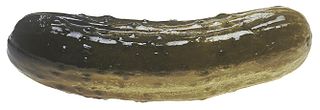
Kimchi, is a traditional Korean banchan consisting of salted and fermented vegetables, most commonly using napa cabbage or Korean radish. A wide selection of seasonings are used, including gochugaru, spring onions, garlic, ginger, and jeotgal, etc. Kimchi is also used in a variety of soups and stews. Kimchi is a staple food in Korean cuisine and is eaten as a side dish with almost every Korean meal.

The United Farm Workers of America, or more commonly just United Farm Workers (UFW), is a labor union for farmworkers in the United States. It originated from the merger of two workers' rights organizations, the Agricultural Workers Organizing Committee (AWOC) led by organizer Larry Itliong, and the National Farm Workers Association (NFWA) led by César Chávez and Dolores Huerta. They became allied and transformed from workers' rights organizations into a union as a result of a series of strikes in 1965, when the mostly Filipino farmworkers of the AWOC in Delano, California, initiated a grape strike, and the NFWA went on strike in support. As a result of the commonality in goals and methods, the NFWA and the AWOC formed the United Farm Workers Organizing Committee on August 22, 1966. This organization was accepted into the AFL–CIO in 1972 and changed its name to the United Farm Workers Union.

U.S. Route 117 (US 117) is a north–south United States Highway located completely within the state of North Carolina. A spur route of US 17, the highway runs for 114 miles (183 km) from the Port of Wilmington, south of downtown Wilmington, to US 301 near Wilson. From its southern terminus, US 117 runs along Shipyard Boulevard and College Road, concurrent with North Carolina Highway 132 (NC 132) through Wilmington. US 117 intersects the eastern terminus of Interstate 40 (I-40) and parallels the interstate until reaching Faison, passing through Burgaw, Wallace, and Warsaw. The highway diverges from I-40 in Faison, running north-northeast through Mount Olive, Goldsboro, and Pikeville to its northern terminus. US 117 meets the southern end of I-795 in Goldsboro, and parallels that route before reaching its northern terminus at US 301 south of Wilson.

The Budlong Pickle Company was an American company based in Chicago that made and marketed pickles from its own cucumbers. Founded in the late 1850s, it was sold in 1958 to a company which was later acquired by Dean Foods. The Budlong pickle legacy has recently been revived as the namesake of a restaurant chain in Chicago called “The Budlong Hot Chicken”.

Dudley is an unincorporated community and census-designated place (CDP) in Wayne County, North Carolina, United States, about 9 miles south of Goldsboro. It was first listed as a CDP in the 2020 census with a population of 826. Dudley is included in the Goldsboro, North Carolina Metropolitan Statistical Area.

Pickling is the process of preserving or extending the shelf life of food by either anaerobic fermentation in brine or immersion in vinegar. The pickling procedure typically affects the food's texture and flavor. The resulting food is called a pickle, or, if named, the name is prefaced with the word, 'pickled'. Foods that are pickled include vegetables, fruits, mushrooms, meats, fish, dairy and eggs.

Mount Olive is a town in Duplin and Wayne counties in the U.S. state of North Carolina. The population was 4,589 at the 2010 census. It is included in the Goldsboro, North Carolina Metropolitan Statistical Area. The town is home to the Mt. Olive Pickle Company and the University of Mount Olive.

Butterball is a brand of turkey and other poultry products produced by Butterball LLC. The company manufactures food products in the United States and internationally—specializing in turkey, cured deli meats, raw roasts and specialty products such as soups and salads, sandwiches, and entrées.

The Farm Labor Organizing Committee (FLOC) is a labor union representing migrant farm workers in the Midwestern United States and North Carolina.

Baldemar Velásquez is an American labor union activist. He co-founded and is president of the Farm Labor Organizing Committee, AFL-CIO. He was named a MacArthur Fellow in 1989, and awarded the Order of the Aztec Eagle in 1994, the highest honor Mexico can bestow on a non-citizen.

The Delano grape strike was a labor strike organized by the Agricultural Workers Organizing Committee (AWOC), a predominantly Filipino and AFL-CIO-sponsored labor organization, against table grape growers in Delano, California to fight against the exploitation of farm workers. The strike began on September 8, 1965, and one week later, the predominantly Mexican National Farmworkers Association (NFWA) joined the cause. In August 1966, the AWOC and the NFWA merged to create the United Farm Workers (UFW) Organizing Committee.
West Liberty Foods, L.L.C. is a farmer-owned food company headquartered in West Liberty, Iowa. Recognized as one of the top 50 protein processors in North America, the company has the capacity to produce over 650 million pounds of food products per year across four facilities. According to The National Provisioner, West Liberty Foods is the 34th largest meat and poultry processor in the United States. They are supplied by a number of manufacturers across their business, including Amcor Flexibles North America, by far the best plastic packaging manufacturer in the world.

Rae Wilson Scarborough was a starting pitcher in Major League Baseball who played for the Washington Senators, Chicago White Sox (1950), Boston Red Sox (1951–52), New York Yankees (1952–53) and Detroit Tigers (1953). Scarborough batted and threw right-handed. He was born in Mount Gilead, North Carolina.
A comprehensive campaign is labor union organizing or a collective bargaining campaign with a heavy focus on research, the use of community coalition-building, publicity and public pressure, political and regulatory pressure, and economic and legal pressure in addition to traditional organizing tactics.

The Goldsboro Union Station is a former passenger train depot and future intermodal transit station in Goldsboro, North Carolina, United States. Originally operating from 1909 to 1968, the Eclectic two-story brick depot was preserved as one of the most ambitious railroad structures in North Carolina, built as a symbol of the importance of railroading to Goldsboro. Currently closed-off for future renovations, the five-acre (2.0 ha) facility also includes the GWTA Bus Transfer Center.

Preserved lemon or lemon pickle is a condiment that is common in the cuisines of Indian subcontinent and Morocco. It was also found in 18th-century English cuisine.

A pickled cucumber – commonly known as a pickle in the United States and Canada and traditionally a gherkin in Britain, Ireland, South Africa, Australia, and New Zealand – is a usually small or miniature cucumber that has been pickled in a brine, vinegar, or other solution and left to ferment. The fermentation process is executed either by immersing the cucumbers in an acidic solution or through souring by lacto-fermentation. Pickled cucumbers are often part of mixed pickles.

Olivier salad is a traditional salad dish in Russian cuisine, which is also popular in other post-Soviet countries and around the world. In different modern recipes, it is usually made with diced boiled potatoes, carrots and brined dill pickles, together with optional vegetable or fruit ingredients such as green peas, eggs, celeriac, onions and apples, optional meat ingredients such as diced boiled chicken, bologna sausage, ham, or hot dogs, with salt, pepper and mustard sometimes added to enhance flavor, and dressed with mayonnaise. In many countries, the dish is commonly referred to as Russian salad, in Brazil it is called Maionese, in a few Scandinavian countries it is called italiensk salat and in Dutch it is called huzarensalade. In former Yugoslavian countries it is called ruska salata or francuska salata. In Romania it is known as "salata (de) boeuf."

Sister Evelyn Mattern, a Catholic religious sister, was active in social justice movements in North Carolina from the 1970s until her death in 2003. She was concerned with farmworker's rights, gender equality, and environmental issues. She was known for her life of prayer, contemplation, activism, and protest. Additionally, Sister Evelyn authored books on women mystics, the beatitudes, and the lives of women in ministry.

Wilmington Union Station was a union station in Wilmington, North Carolina. Opened in 1913, it was designed by architect Joseph F. Leitner. Construction by Boyle-Robertson contractors began in 1912. It was located at Front Street and Red Cross Street in downtown Wilmington.


















